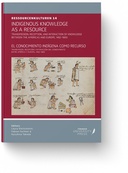Explore

Indigenous Knowledge as a Resource: Transmission, Reception, and Interaction of Knowledge between the Americas and Europe, 1492-1800
0 Ungluers have
Faved this Work
Login to Fave
Since antiquity, knowledge has often been juxtaposed with opinion. Whereas opinion commonly refers to subjective perceptions and viewpoints, knowledge is typically intended to represent objective and verifiable propositions. On this view, knowledge per se claims a universal dimension in that it pretends to be approvable through the reason of everyone, everywhere. This universal aspect of the concept of knowledge stands in marked contrast to cultures of local knowledge, where the generation of knowledge is dependent on specific times and places. These divergent aspects came into conflict when Indigenous knowledge was contested by Europeans and likewise, Indigenous challenges to European knowledge occurred. Based on religious, linguistic, demographic, and cultural disparities, knowledge operative in one context was adapted, manipulated, reframed, or dismissed as spurious or heretical in another framework. This book focuses on historical examples of Indigenous knowledge from 1492 until circa 1800, with contributions from the fields of history, art history, geography, anthropology, and archaeology.
This book is included in DOAB.
Why read this book? Have your say.
You must be logged in to comment.
